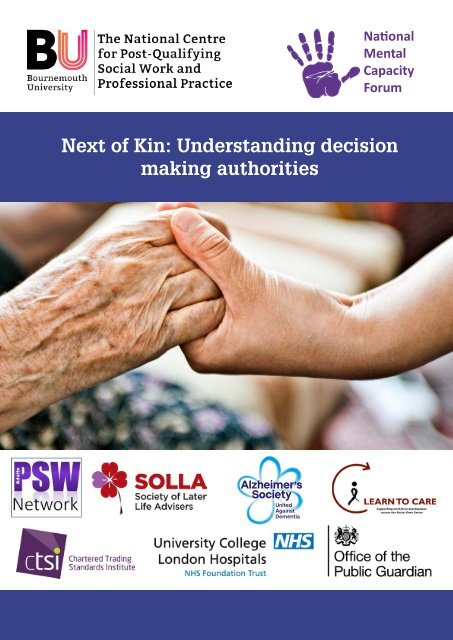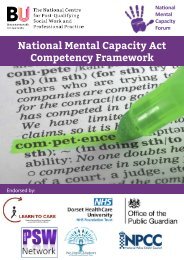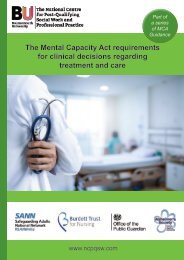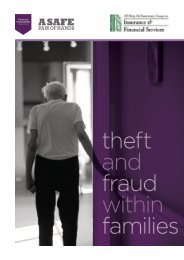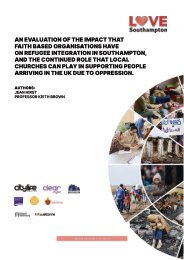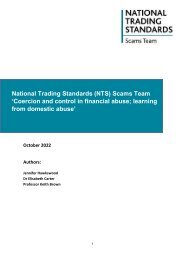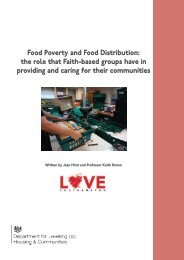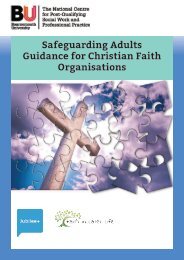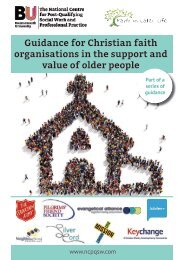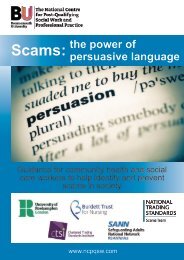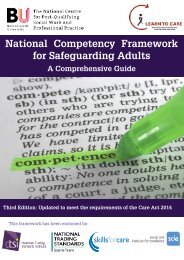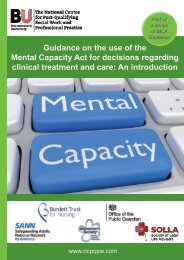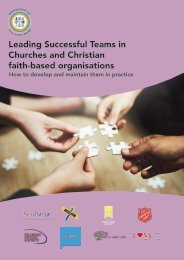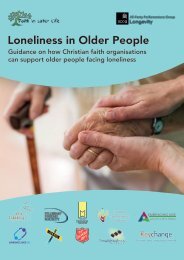Next of Kin Understanding Decision Making Authorities
The term Next of Kin (NoK) is commonly used and there is a presumption that the person you identify as your NoK has certain rights and duties. Health and social care colleagues should always consult the people closest to a person who lacks capacity to understand that person’s wishes and feelings to help them make a decision in that person’s best interests. However, the person identified as next of kin should not be asked to sign and/ or consent to certain interventions (unless they have a legal basis for doing so – see overleaf). This is a mistake often made in many hospital and nursing or residential type accommodations, where family members are asked to sign care plans, end of life plans and other treatment options and provide consent which is not legally valid.
The term Next of Kin (NoK) is commonly used and there is a presumption that the person
you identify as your NoK has certain rights and duties. Health and social care colleagues
should always consult the people closest to a person who lacks capacity to understand
that person’s wishes and feelings to help them make a decision in that person’s best
interests. However, the person identified as next of kin should not be asked to sign and/
or consent to certain interventions (unless they have a legal basis for doing so – see
overleaf). This is a mistake often made in many hospital and nursing or residential type
accommodations, where family members are asked to sign care plans, end of life plans
and other treatment options and provide consent which is not legally valid.
- No tags were found...
Create successful ePaper yourself
Turn your PDF publications into a flip-book with our unique Google optimized e-Paper software.
National<br />
Mental<br />
Capacity<br />
Forum<br />
<strong>Next</strong> <strong>of</strong> <strong>Kin</strong>: <strong>Understanding</strong> decision<br />
making authorities
The term ‘<strong>Next</strong> <strong>of</strong> <strong>Kin</strong>’ is <strong>of</strong>ten used in Health and Social Care as<br />
a euphemistic shorthand for ‘Who is the person we communicate<br />
with about you and who do we contact when you are dead?’<br />
In law the term has no status when you are alive - it is<br />
misleading too because it does not clarify if this is the person<br />
who is your nearest relative or the person most important to you.<br />
Indeed, these are <strong>of</strong>ten different people.<br />
This helpful leaflet clarifies how people can plan ways, with<br />
those they love, to ensure their wishes are taken into account<br />
if through illness they cannot take decisions for themselves. I<br />
cannot stress enough how important it is to plan ahead and let<br />
our wishes be known, in the event we cannot express them.<br />
As Chair <strong>of</strong> the National Mental Capacity Forum I commend this advice leaflet; we<br />
all want the best care provided in accordance with our wishes and this leaflet helps<br />
everyone understand how to ensure that happens.<br />
Baroness Ilora Finlay.<br />
<strong>Next</strong> <strong>of</strong> <strong>Kin</strong> (NoK)<br />
The term <strong>Next</strong> <strong>of</strong> <strong>Kin</strong> (NoK) is commonly used and there is a presumption that the person<br />
you identify as your NoK has certain rights and duties. Health and social care colleagues<br />
should always consult the people closest to a person who lacks capacity to understand<br />
that person’s wishes and feelings to help them make a decision in that person’s best<br />
interests. However, the person identified as next <strong>of</strong> kin should not be asked to sign and/<br />
or consent to certain interventions (unless they have a legal basis for doing so – see<br />
overleaf). This is a mistake <strong>of</strong>ten made in many hospital and nursing or residential type<br />
accommodations, where family members are asked to sign care plans, end <strong>of</strong> life plans<br />
and other treatment options and provide consent which is not legally valid.<br />
Advance <strong>Decision</strong>s<br />
If you have a particular preference or view about a type <strong>of</strong> treatment it is possible to<br />
make an advance decision to refuse this. This is called an Advance <strong>Decision</strong> in the Mental<br />
Capacity Act 2005. It is sometimes referred to as a ‘living will’ however this is not a legal<br />
term as a will only really applies after someone’s death.<br />
Under the Mental Capacity Act 2005 these types <strong>of</strong> decisions have legal status. An advance<br />
decision can only be made by a person if they are over the age <strong>of</strong> 18 and have capacity to<br />
make that decision. They must state which treatment they are refusing and the decision<br />
can be changed/amended at any time by the person themselves. Health and social care<br />
pr<strong>of</strong>essionals seeking to provide treatment once the person has lost capacity to make the<br />
decision will need to check whether a decision exists, if it does is it valid (i.e. the person has<br />
not altered the decision) and if it is applicable to the treatment being proposed.<br />
A valid and applicable advance decision to refuse treatment has the same effect as the<br />
person making the decision themselves at the time it needs to be made.<br />
More guidance is available to support pr<strong>of</strong>essionals and carers think about whether an<br />
advance decision applies in Chapter 9 <strong>of</strong> the Code <strong>of</strong> Practice which accompanies the<br />
Mental Capacity Act 2005.
Lasting Powers <strong>of</strong> Attorney<br />
Your next <strong>of</strong> kin does not have legal decision-making authority.<br />
<strong>Making</strong> a lasting power <strong>of</strong> attorney (LPA) is the best way to give<br />
someone you trust the legal authority to make decisions for you if<br />
you lose mental capacity. There are two types: one for property<br />
and finance and one for health and welfare decisions.<br />
An enduring power <strong>of</strong> attorney (EPA) made before October 2007<br />
is still legally valid. These are for decisions about property and<br />
finance only and cannot be used for health and welfare decisions.<br />
You must have mental capacity to make an LPA. It must be<br />
registered with the Office <strong>of</strong> the Public Guardian. A health and<br />
welfare LPA only comes into effect if you lose mental capacity -<br />
your attorney can make decisions about your medical treatment<br />
or care. They would not normally be the sole decision-maker<br />
but would be entitled to be consulted by clinicians and other<br />
pr<strong>of</strong>essionals so that your wishes are considered.<br />
However, there is a section in the LPA where you can give your<br />
attorney the right to make decisions for you about life-sustaining<br />
treatment. Please note an LPA with life-sustaining treatment<br />
clauses will over-rule an advance decision on life-sustaining<br />
treatment you made earlier.<br />
It currently costs £82* to register an LPA, or £164* if you make one<br />
for property and finance and one for health and welfare decisions.<br />
You may qualify for a fee reduction if you have a low income or are<br />
entitled to certain benefits. You don’t need a solicitor to make an<br />
LPA; you can do it online. There’s information on GOV.UK to help<br />
you. Visit: www.gov.uk/power-<strong>of</strong>-attorney/make-lasting-power.<br />
If a person lacks mental capacity and does not have an LPA, the<br />
Court <strong>of</strong> Protection may appoint a ‘deputy’. For health and welfare<br />
decisions, this is normally only if there are serious decisions<br />
about treatment to be made, or a disagreement about what is in<br />
the person’s best interests. A next <strong>of</strong> kin can apply to become a<br />
deputy. Visit: www.gov.uk/courts-tribunals/court-<strong>of</strong>-protection.<br />
Your next <strong>of</strong> kin does not have legal powers to make health<br />
decisions for you without an LPA or unless they have been<br />
appointed as your deputy by the Court <strong>of</strong> Protection.<br />
Did you know?<br />
• That there is no legal<br />
basis for next <strong>of</strong> kin<br />
• If your loved one<br />
is in hospital and<br />
unable to consent<br />
to treatment, you<br />
have no legal right to<br />
give consent on their<br />
behalf unless certain<br />
legal procedures are<br />
in place<br />
There is actually only<br />
one situation where<br />
‘next <strong>of</strong> kin’ is legally<br />
valid; this is if you die<br />
without leaving a will.<br />
In this case, your estate<br />
will be passed on to the<br />
person or people who<br />
are your closest blood<br />
relation, also termed as<br />
your next <strong>of</strong> kin.<br />
The Mental Capacity<br />
Act 2005 has rectified<br />
this problem by<br />
introducing a number<br />
<strong>of</strong> ways to ensure your<br />
wishes and feelings<br />
are considered should<br />
a time come when you<br />
are unable to make a<br />
decision for yourself.<br />
Relying on an identified<br />
‘next <strong>of</strong> kin’ is not one <strong>of</strong><br />
those ways.<br />
*Please note, this was correct at the time <strong>of</strong> print, see OPG website for current cost.<br />
Court <strong>of</strong> Protection and Court Appointed Deputies<br />
If a person lacks capacity to make a particular decision and they have not made an LPA or<br />
advance decision, it may be necessary to apply to the Court <strong>of</strong> Protection to make the decision<br />
in the person’s best interests. Where a number <strong>of</strong> decisions need to be made on an ongoing<br />
basis the Court may appoint a Deputy to act on that person’s behalf. A Deputy may be a family<br />
member, a pr<strong>of</strong>essional (such as a solicitor or accountant) <strong>of</strong> the relevant local authority.<br />
For more information, please refer to Chapter 8 <strong>of</strong> the MCA Code <strong>of</strong> Practice or visit the Court<br />
<strong>of</strong> Protection website at https://www.gov.uk/courts-tribunals/court-<strong>of</strong>-protection for more<br />
details on making an application to the Courts.<br />
Daisy Bogg and Pr<strong>of</strong>essor Keith Brown, May 2016. Updated March 2018<br />
The National Centre <strong>of</strong> Post-Qualifying Social Work and Pr<strong>of</strong>essional Practice
National<br />
Mental<br />
Capacity<br />
Forum<br />
National Centre for Post Qualifying Social Work and Pr<strong>of</strong>essional Practice<br />
Bournemouth University, 4th floor, Royal London House,<br />
Christchurch Road, Bournemouth, BH1 3LT<br />
Tel: +44 (0)1202 964765<br />
Fax: +44 (0)1202 962025<br />
Email: pqsw@bournemouth.ac.uk<br />
Website: www.ncpqsw.com<br />
Twitter: @researchpqsw<br />
Copyright 2016 © The National Centre for Post-Qualifying Social Work and Pr<strong>of</strong>essional Practice,<br />
Bournemouth University.<br />
All rights reserved. This publication may be reproduced or utilised in any form or by any means,<br />
electronic or mechanical, including photocopying, recording or any information or storage or<br />
retrieval without prior permission from the publisher for personal and educational use only.<br />
Produced by Bournemouth University on recycled paper.<br />
Bournemouth University has Fairtrade status.


